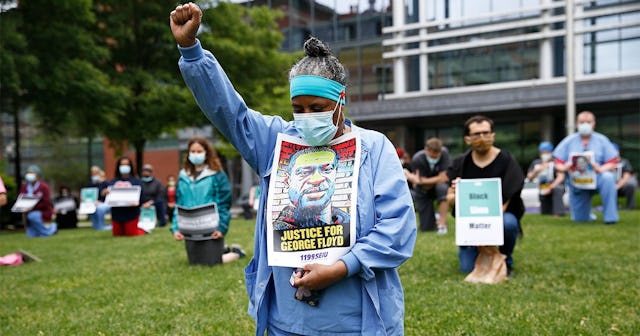The Protests Are Necessary And Important — But We Can't Afford To Forget About COVID-19

When I saw the video of George Floyd being murdered in the streets of Minneapolis, I was shocked. I was outraged. And I was left with that sickening “they did it again” feeling that hits me every time an unarmed person of color is murdered in the hands of the police. Rightfully, people hit the streets, and protests started. And for now, anyway, it almost feels like changes are underway to address the systematic problem of police violence against people of color; the cause seems to be gaining critical mass, and it’s about time.
But as crucial as all of this is — while it’s been burning up my social media feed, and consuming all of my conversations with every single person I know — I cannot help but look at these mass demonstrations and say to myself, What about COVID-19?
We are six months into 2020, and each month has been more unbelievable than the one before it. All of it has been hard to comprehend or predict. But the reality stands: COVID-19 doesn’t care about police violence, or the human race in general. And while cases have decreased in some areas of the country, such as New York, in other areas — Arizona, Arkansas, Florida, and Texas, for example — it’s raging more than ever.
PAUL ELLIS/Getty
This virus hasn’t gone anywhere. It’s still here. It’s still infecting thousands of people a day.
The COVID-19 pandemic has now claimed more than 400,000 lives worldwide, according to data collected by Johns Hopkins University. The university’s Coronavirus Resource Center noted this horrifying milestone on Sunday. The United States, at more than 109,000, accounts for more than a quarter of those deaths. Worldwide, more than 6.9 million people have been infected with the coronavirus since the first known cases began to emerge in the Chinese province of Hubei late last year. Experts at Johns Hopkins say infections are expected to surpass 7 million by mid-week. The U.S. has seen more than 1.9 million cases.
In my home state of Oregon, the infection rate has hit an all-time high. According to The Oregonian, 620 confirmed or presumed COVID-19 infections were reported in the past week, including the state’s largest and second-largest daily case totals of 146 on Sunday and 114 on Monday.
But the really scary part is, the most recently reported rise in infections does not include any infections due to active protest. It’s too early to see how the above-mentioned mass gatherings in the name of social justice will impact the spread of COVID-19 because the virus generally has an incubation time of up to two weeks.
But the reality is, there will be an increase in infections. And don’t get me wrong: I support the protests going on nationally. They are sparking a conversation around race and its relationship with authority in the U.S., and worldwide, that has needed to happen for a very, very, long time. And yes, I am happy to see that many protesters are wearing face coverings. But many are not, and face coverings are not foolproof, and mass gatherings of people, less than six feet apart, screaming for change, is a perfect scenario for more COVID-19 infections.
The Boston Globe/Getty
According to NPR, Dr. Anthony Fauci, the head of the National Institute of Allergy and Infectious Diseases, told a Washington, D.C. radio station on Friday that the protests are a “perfect set-up for further spread of the virus. I get very concerned, as do my colleagues in public health, when they see these kinds of crowds,” Fauci told WTOP. “There certainly is a risk. I can say that with confidence.”
In a surprising move, however, the World Health Organization believes that public protests are important, even now, in the shadow of a pandemic. According to NPR, WHO director-general Tedros Adhanom Ghebreyesus released this statement on the protests: “WHO fully supports equality and the global movement against racism. We reject discrimination of all kinds.”
On the heels of the protests are state initiatives to open up the U.S. I live in a pretty rural area of Oregon, and my county just moved into phase two, along with most of the state of Oregon. Las Vegas opened the city’s iconic casinos on Thursday. This was the first weekend being open for business since Nevada’s stay at home order went into effect in March. Though casino staff wore masks, patrons weren’t required to wear them, and according to an Associated Press report, many did not.
All in all, what we have here is a tangled web of much needed activism happening during a pandemic, at the same time as states push to ease restrictions to revitalize their economies — and the aftermath of all of this happening simultaneously is yet to be determined. All of it is making my head spin, and I’m kind of wondering what’s up for July, and I’m afraid it might include an alien invasion.
In all seriousness, the fact remains that COVID-19 is still a very real threat — and it is right there, in the streets, along with the protesters. Most likely there will be an increase of infections in the aftermath of these protests, but hopefully there will also be some pretty serious and much needed social change to go along with it.
This article was originally published on